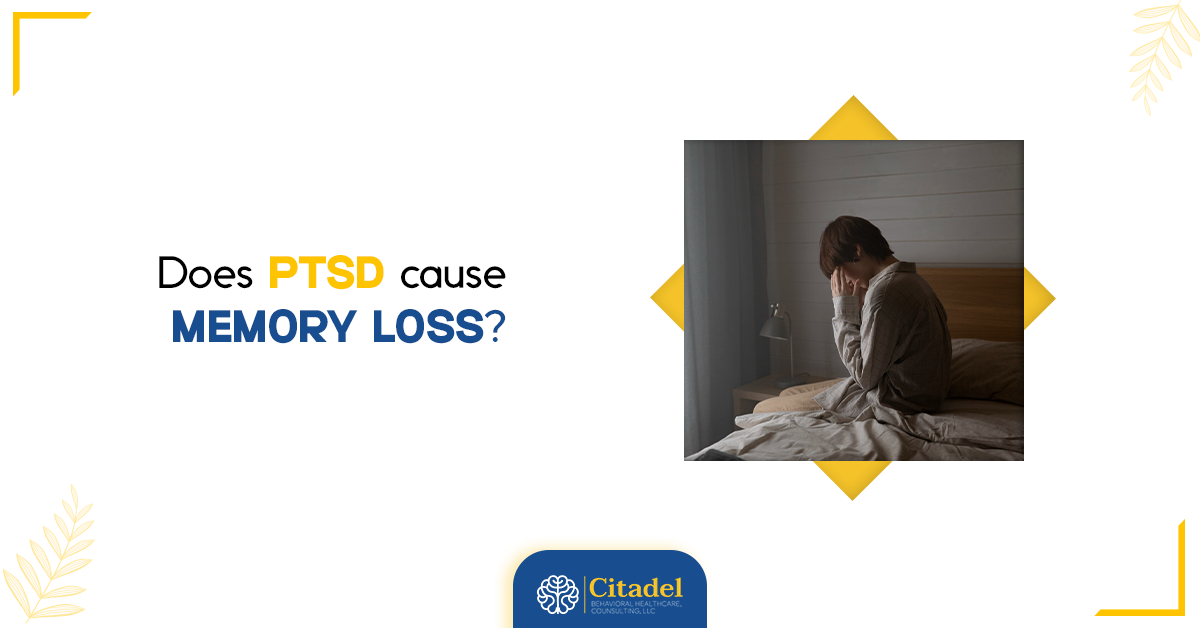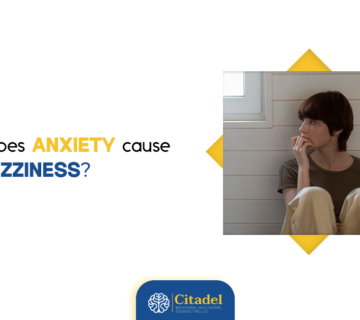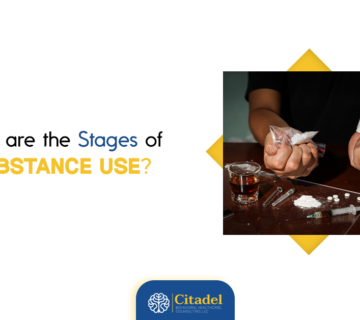Post-Traumatic Stress Disorder (PTSD) is a mental health issue. It hits many who have faced severe stress or scary episodes. A big talk point about PTSD is the loss of memory.
Lots of those with PTSD may wonder, “Does PTSD cause memory loss?” It’s not an easy answer, but it’s crucial to understand how scary experiences can shake up the brain and memory.
Let’s delve into the tie between PTSD and forgetting things. We’ll cover how scary situations tweak memory, and the steps to improve memory.
Are you living with PTSD? At Citadel Behavioral Health, we support individuals managing PTSD along with other psychological conditions. We provide personal, focused therapy sessions to help you shine. Reach out to us for further details.
What Is PTSD?
Recognizing PTSD Before we relate PTSD and memory issues. PTSD is a term for a condition that sets in following a horrifying experience. Examples of such experiences could be:
- A car accident
- A natural disaster
- A violent attack
- Any condition that provokes acute alarm, weakness, or dismay
It’s normal to feel stressed or scared after such events. But, for some individuals, those feelings hang on. They can turn into PTSD. This condition can affect daily life through emotional and physical symptoms.
Does PTSD Cause Memory Loss?
Yes, PTSD is responsible for memory loss. People with PTSD often face memory-related issues. They might forget significant episodes of their lives.
Remembering past events, particularly the distressing ones, can be tough for some. Recalling common tasks or recent happenings might also be challenging.
It can lead to a lot of annoyance. Understanding these memory hitches connected to how the brain reacts to trauma is vital.
Why Does Trauma Cause Memory Loss?
Several factors contribute to trauma causing memory loss:
- Stress Hormones: When a shocking occurrence o, the body releases cortisol and adrenaline. These hormones are vital for survival. However, long-term exposure can harm brain cells and impair memory.
- Dissociation: People may dissociate during trauma, detaching themselves from reality. This mechanism can block memory formation entirely.
- Fragmented Storage: Traumatic memories are often stored in fragmented ways, making them harder to retrieve as cohesive stories.
How Does PTSD Affect the Brain?
PTSD can cause amnesia. To understand this, we must observe how the brain responds to trauma. Key areas involved are:
- Hippocampus
- Amygdala
- Prefrontal Cortex
In PTSD, stress affects these areas, causing memory issues.
The Amygdala’s Role
During trauma, the amygdala is very active. It processes fear and prompts quick reactions to danger. In PTSD, it stays overactive, leading to:
- Persistent bad memories
- Memories that feel always present
The Hippocampus’s Impact
The hippocampus is central to memory. It may struggle to form new memories. This can make someone with PTSD say, “I can’t remember most of my life,” or feel their memory is unclear. It becomes hard to tell the past from the present, leading to confusion.
PTSD and Short-Term Memory Loss
PTSD often causes short-term memory loss. Affected individuals struggle to remember names, appointments, or daily tasks.
This can be frustrating and disrupt daily life. The brain may focus on traumatic events. This can damage its other recollections.
Additionally, short-term memory loss in PTSD can lead to feeling overwhelmed and stressed. This occurs because individuals feel unable to meet daily demands.
What Is Complex PTSD and Cognitive Impairment?
Complex PTSD is a category of PTSD. It often shows up after long periods of harsh experiences like persistent abuse or neglect.
Complex PTSD can cause cognitive impairment and severe memory loss, in addition to the main PTSD symptoms. Individuals with this condition may face even harsher memory problems.
This includes troubles with processing details and remembering vital events from their past. We’re still looking into the link between complex PTSD and cognitive impairment.
However ongoing traumatic experiences can change the brain over time, particularly in areas tied to memory.
Complex PTSD can cause memory loss. It affects both recent and distant memories. This raises the struggle of overseeing routine activities.
Does Tinnitus Wipe Your Memory?
PTSD can sometimes bring about tinnitus, and ear ringing. This condition is annoying and diverts your attention, making some question, “Does tinnitus wipe your memory?”
Tinnitus doesn’t cause forgetfulness, but the constant noise can disrupt focus. This makes it look like memory is fading, whereas the real issue lies in focusing due to the ongoing ear ringing.
Is Memory Loss a Trauma Response?
Yes, memory lapse is a regular reaction to trauma. It’s the brain’s response to heavy stress. But, this response doesn’t always protect.
It can leave people confused, detached, or fearful. PTSD and memory loss recovery requires understanding these patterns and working to heal them.
How to Fix Memory Loss from Trauma?
Fixing trauma memory loss involves several steps to help the brain heal. Here’s a simple plan:
- Psychotherapy assists in working through trauma and its sentiments. Methods like Cognitive Behavioral Therapy and EMDR can refresh memory by overcoming trauma.
- Mindfulness and meditation improve focus and reduce stress, enhancing memory over time.
- Try memory exercises or brain training apps to improve recall.
- Eat well, exercise, and sleep enough. These are vital for brain health and memory recovery.
- Doctors may prescribe medication for anxiety or depression affecting memory. This helps stabilize mood and improve focus.
- Journaling or using art and music helps process memories and emotions, improving recall.
- Spending time with loved ones or support groups reduces isolation and stress, improving memory.
- Healing takes time. Be patient with yourself.
For severe memory loss, consult a doctor.
Conclusion
Does PTSD cause memory loss? Yes, PTSD can indeed impact memory. Trauma can harm the brain and upset normal memory. This incorporates short-lived and permanent memory problems.
These problems stem from the brain’s reaction to stress and trauma. However, recovery is possible. With the right support and treatment, people with PTSD can improve. They can refresh their memory and psychological health.
If you or someone you know has PTSD and memory loss, please get a mental health professional at Citadel Behavioral Health for help.
FAQs
Can emotional trauma cause memory loss?
Yes, severe emotional stress can cause memory loss. It affects how our brain handles memories. Conditions like PTSD often show this, where upsetting experiences disrupt memory functions.
Can trauma affect your memory long-term?
Yes, trauma can. It leaves emotional scars and memory challenges. Many people struggle with:
- Remembering happy times, as negative memories take over.
- Feeling tired from the effort to recall things.
- Dealing with flashbacks or intrusive thoughts that disrupt focus (PTSD memory problems).





No comment